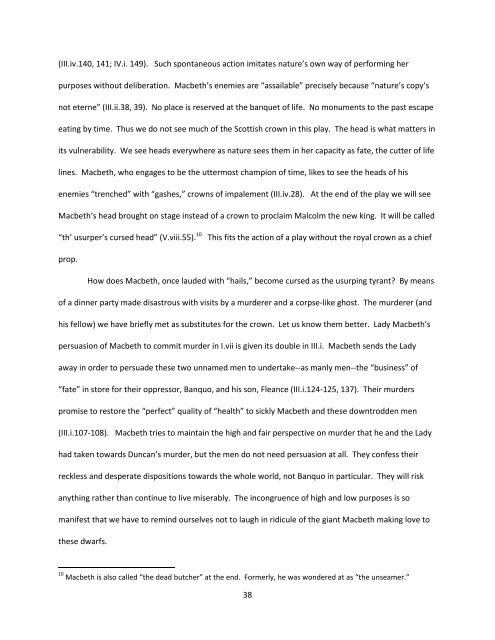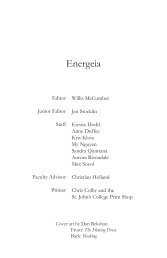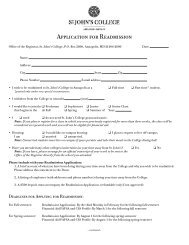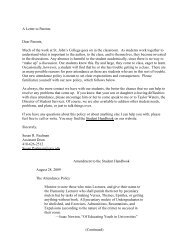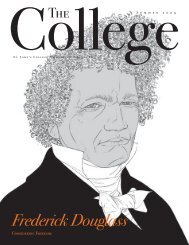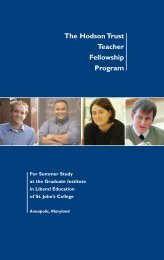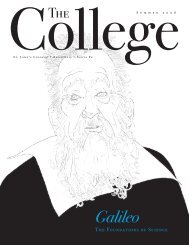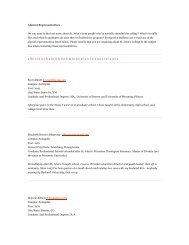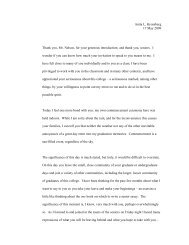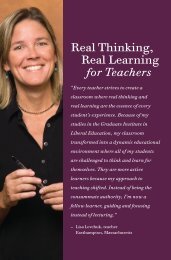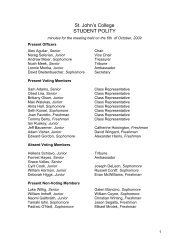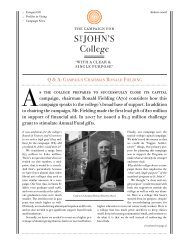âTo Meet with Macbeth,â given by tutor Louis ... - St. John's College
âTo Meet with Macbeth,â given by tutor Louis ... - St. John's College
âTo Meet with Macbeth,â given by tutor Louis ... - St. John's College
Create successful ePaper yourself
Turn your PDF publications into a flip-book with our unique Google optimized e-Paper software.
(III.iv.140, 141; IV.i. 149). Such spontaneous action imitates nature’s own way of performing her<br />
purposes <strong>with</strong>out deliberation. <strong>Macbeth</strong>’s enemies are “assailable” precisely because “nature’s copy’s<br />
not eterne” (III.ii.38, 39). No place is reserved at the banquet of life. No monuments to the past escape<br />
eating <strong>by</strong> time. Thus we do not see much of the Scottish crown in this play. The head is what matters in<br />
its vulnerability. We see heads everywhere as nature sees them in her capacity as fate, the cutter of life<br />
lines. <strong>Macbeth</strong>, who engages to be the uttermost champion of time, likes to see the heads of his<br />
enemies “trenched” <strong>with</strong> “gashes,” crowns of impalement (III.iv.28). At the end of the play we will see<br />
<strong>Macbeth</strong>’s head brought on stage instead of a crown to proclaim Malcolm the new king. It will be called<br />
“th’ usurper’s cursed head” (V.viii.55). 10<br />
This fits the action of a play <strong>with</strong>out the royal crown as a chief<br />
prop.<br />
How does <strong>Macbeth</strong>, once lauded <strong>with</strong> “hails,” become cursed as the usurping tyrant? By means<br />
of a dinner party made disastrous <strong>with</strong> visits <strong>by</strong> a murderer and a corpse-like ghost. The murderer (and<br />
his fellow) we have briefly met as substitutes for the crown. Let us know them better. Lady <strong>Macbeth</strong>’s<br />
persuasion of <strong>Macbeth</strong> to commit murder in I.vii is <strong>given</strong> its double in III.i. <strong>Macbeth</strong> sends the Lady<br />
away in order to persuade these two unnamed men to undertake--as manly men--the “business” of<br />
“fate” in store for their oppressor, Banquo, and his son, Fleance (III.i.124-125, 137). Their murders<br />
promise to restore the “perfect” quality of “health” to sickly <strong>Macbeth</strong> and these downtrodden men<br />
(III.i.107-108). <strong>Macbeth</strong> tries to maintain the high and fair perspective on murder that he and the Lady<br />
had taken towards Duncan’s murder, but the men do not need persuasion at all. They confess their<br />
reckless and desperate dispositions towards the whole world, not Banquo in particular. They will risk<br />
anything rather than continue to live miserably. The incongruence of high and low purposes is so<br />
manifest that we have to remind ourselves not to laugh in ridicule of the giant <strong>Macbeth</strong> making love to<br />
these dwarfs.<br />
10 <strong>Macbeth</strong> is also called “the dead butcher” at the end. Formerly, he was wondered at as “the unseamer.”<br />
38


